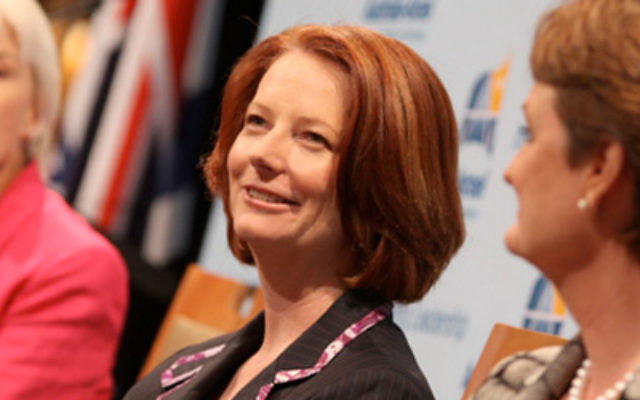One-on-one with the PM
WITH an election in the air, it seemed somewhat poignant on Monday that Prime Minister Julia Gillard was chatting with The Australian Jewish News in her office.
WITH an election in the air, it seemed somewhat poignant on Monday that Prime Minister Julia Gillard was chatting with The Australian Jewish News in her office.
After all, The AJN was the very first paper the PM spoke to after taking the reins of the country three years ago.
In that time, much has changed. But one key concern still tops the agenda of Jews worldwide – the threat posed to Israel, and indeed the entire world, by a nuclear Iran.
While Gillard backs talking and sanctions as a means to alleviate that threat, she made it clear that every option should remain on the table.
“We are supporters of the international strategy and we do want to see diplomacy have the time to do its work, but I think around the world people are clear, and I am clear in my own mind, that this is not an endless period,” Gillard said.
“If Iran doesn’t respond to that period of diplomacy, then there will come a time that people will look for other options.”
Stressing that Australia’s voice on the global stage does count, Gillard noted the country’s recent election to the UN Security Council. While some felt the government had sacrificed some of its traditional support for Israel to secure the necessary votes for that spot, the PM remained adamant that both nations were beneficiaries of Australia’s international standing.
“If we hadn’t enjoyed the confidence of a large number of nations, we wouldn’t have succeeded in being elected to the United Nations Security Council,” Gillard said. “We have been selected to host the G20 meeting in 2014 and we have the 12th largest economy in the world.
“We certainly have the ability to voice our concerns on the world stage, in the UN and generally.
“We do that very consistently about the Middle East, about Israel’s right to exist in secure borders as a Jewish state, and the need to see negotiations which will lead to a two-state solution and a lasting peace for Israel and for the Palestinian people.”
But while the Middle East is an ongoing problem for leaders across the world, this week in Canberra was about one man, Raoul Wallenberg.
Australia’s Jewish leaders joined the PM, Opposition Leader Tony Abbott, Governor-General Quentin Bryce and Holocaust survivors to honour the Swedish diplomat, who saved tens of thousands of Jewish lives during the Shoah.
Gillard paid tribute to the Jewish community for its efforts in securing honorary citizenship for Wallenberg.
“The community raising it was absolutely pivotal, and secondly Attorney-General Mark Dreyfus, who reflecting those community views, was very persistent in advocating that we should do something different.
“We have never awarded an honorary citizenship before. For us to do it is a particularly big step because it is the first, but no more fitting person to do it for.”
From honouring a man who stood up to discrimination and hate to the issue of vilification closer to home, Gillard turned her attention to Abbott’s plan to water down Section 18C of the Racial Discrimination Act, which deals with offensive behaviour because of race, colour or national or ethnic origin.
The PM said: “I certainly think it is wrong and a very severely retrograde step for the country. We need in our nation, and in our nation’s laws, to have a way of dealing with hateful speech. “It’s been very important for that provision to be there; it has certainly done some work to deal with hateful speech, and I think it would be a severely retrograde step to have it taken away.”
That, however, has not been the only proposal in Canberra that has caused concern for the community in recent months. The PM herself sparked fury when she set the election date for Yom Kippur, the holiest day on the Jewish calendar. Confessing she was aware of the clash, Gillard said, “I knew that it would cause an issue we would need to work through with the Australian Electoral Commission, to make sure that people were able to vote, and vote in advance of the date.”
She went on to note that because the election date was set months in advance, people have been able to make arrangements to vote. “I’m very confident and all of the community feedback to me has been that they are very confident in the arrangements the Australian Electoral Commission is making to let people know what their alternate ways of voting are.”
JOSHUA LEVI
Prime Minister Julia Gillard.


comments